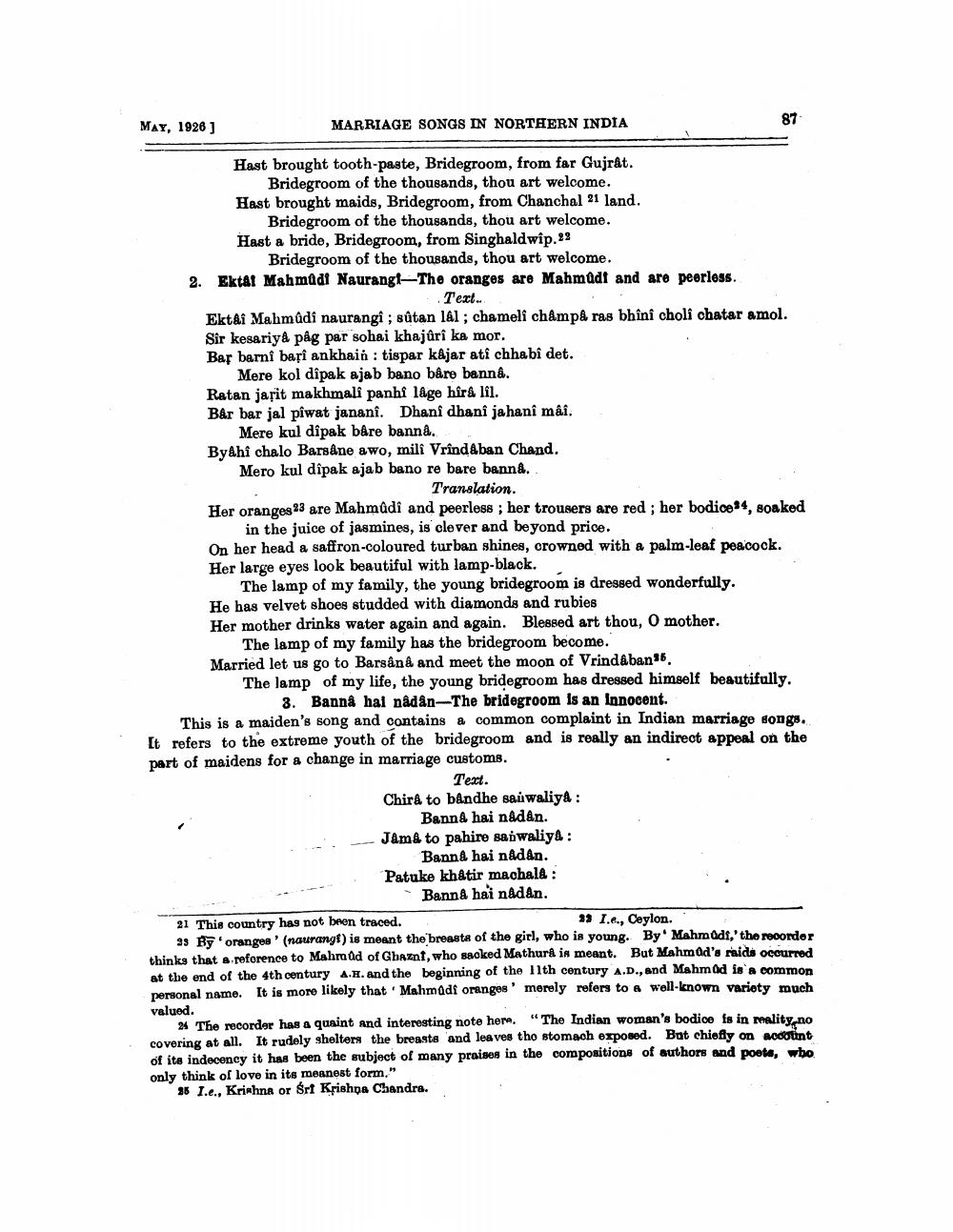________________
MAY, 1926 ]
MARRIAGE SONGS IN NORTHERN INDIA
87
Hast brought tooth-paste, Bridegroom, from far Gujrat.
Bridegroom of the thousands, thou art welcome. Hast brought maids, Bridegroom, from Chanchal 21 land.
Bridegroom of the thousands, thou art welcome. Hast a bride, Bridegroom, from Singhaldwip.22
Bridegroom of the thousands, thou art welcome. 2. Ektat Mahmud Naurang -The oranges are Mahmudt and are peerless.
Text Ektai Mahmûdi naurangi ; sûtan lal; chameli châmpå ras bhînî cholî chatar amol. Sir kesariya pag par sohai khajuri ka mor. Bar barní bari ankhain : tispar k&jar ati chhabi det.
Mere kol dîpak ajab bano bâre banna. Ratan jarit makhmali panhi lage hîrå lil. B&r bar jal piwat janani. Dhani dhani jahani mái.
Mere kul dipak bare banna. ByAhi chalo Barsane awo, mili Vrînd&ban Chand. Mero kul dîpak ajab bano re bare banna.
Translation. Her oranges 23 are Mahmûdi and peerless ; her trousers are red; her bodice?4, soaked
in the juice of jasmines, is clever and beyond price. On her head a saffron-coloured turban shines, crowned with a palm-leaf peacock. Her large eyes look beautiful with lamp-black.
The lamp of my family, the young bridegroom is dressed wonderfully. He has velvet shoes studded with diamonds and rubies Her mother drinks water again and again. Blessed art thou, O mother.
The lamp of my family has the bridegroom become. Married let us go to Barsânâ and meet the moon of Vrindában”. The lamp of my life, the young bridegroom has dressed himself beautifully.
3. Banná hal nädan-The bridegroom is an Innocent. This is a maiden's song and contains a common complaint in Indian marriage songs. It refers to the extreme youth of the bridegroom and is really an indirect appeal on the part of maidens for a change in marriage customs.
Text. Chira to bandhe saúwaliya :
Banna hai nadan. Jame to pahire sanwaliya :
Banna hai nådan. Patuke khatir machala :
Banna hai nadan. 21 This country has not been traced.
33 I..., Ceylon. 33 By 'oranges' (naurange) is meant the breasts of the girl, who is young. By Mahmadf,'the recordor thinks that reforence to Mahmûd of Ghazt, who sacked Mathura in meant. But Mahmod's raids occurred at the end of the 4th century A.H. and the beginning of the 11th century A.D., and Mahmod is a common personal name. It is more likely that Mahmadi oranges' merely refers to a well-known variety much valued.
24 The recorder has a quaint and interesting note her. "The Indian woman's bodice is in mality.no covering at all. It rudely shelters the breasts and leaves tho stomach exposed. But chiefly on account of its indecency it has been the subject of many praises in the compositions of authors and poeta, who only think of love in its meanest form."
36 I.e., Krishna or Śrt Krishna Chandra.




